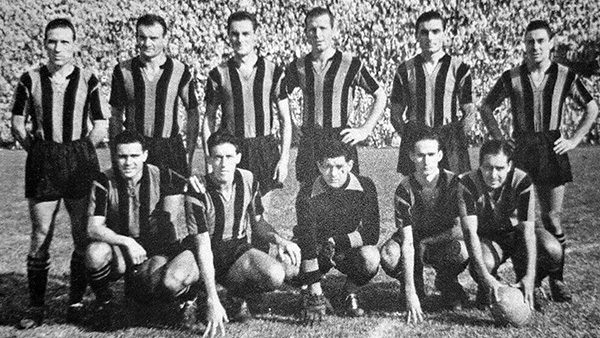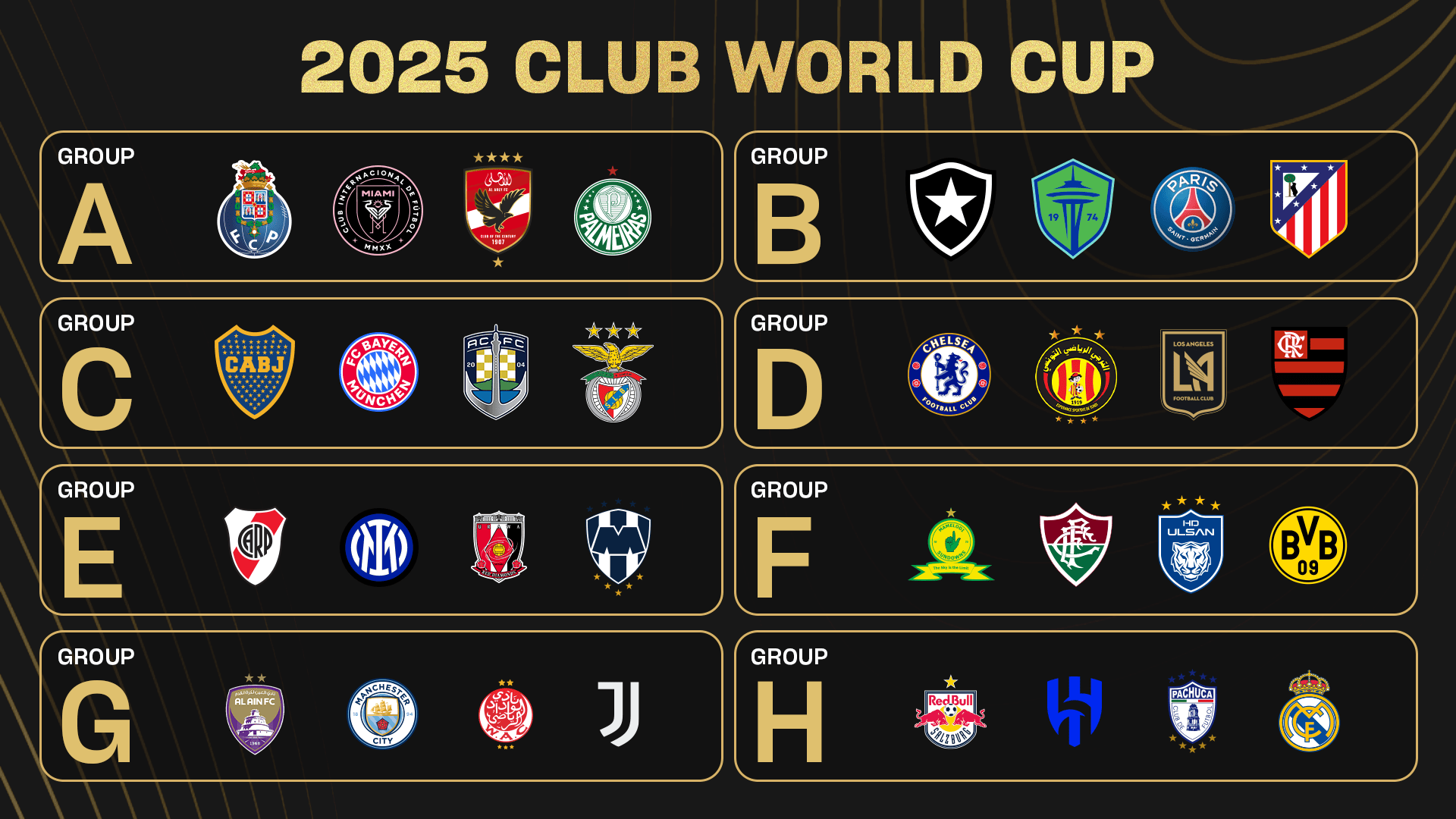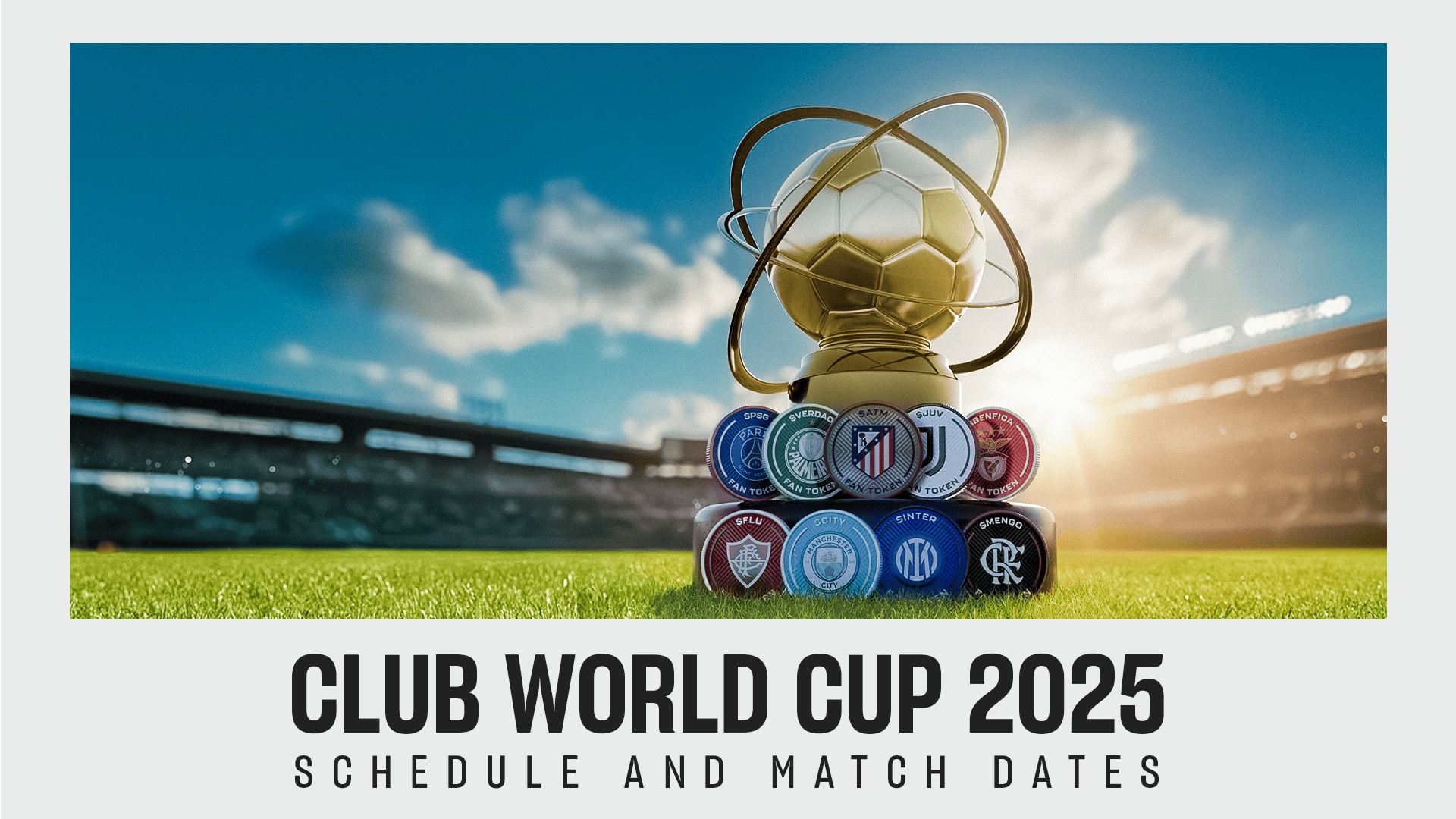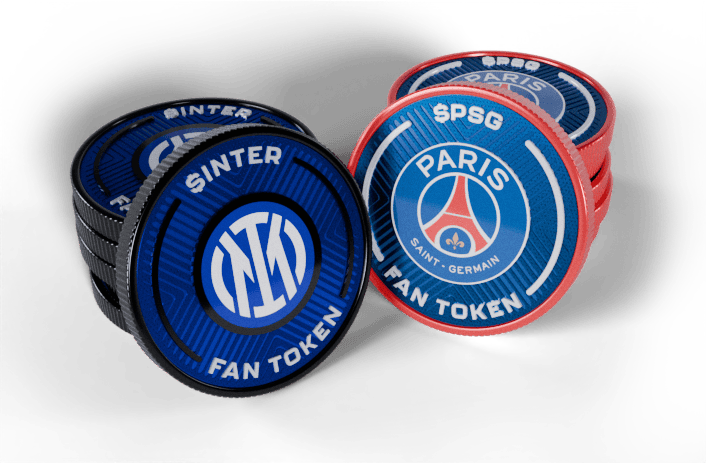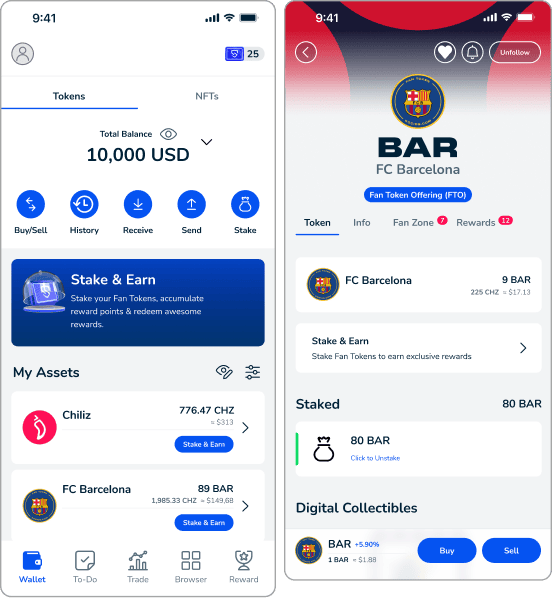Inter Milan was born in 1908 when a group of Italians and Swiss broke away from the cricket club and football club (now known as AC Milan), seemingly unhappy about the domination of Italians in the team.
The group wanted a truly international team and hence the name Internazionale was chosen, and the first club captain, Hernst Marktl, was Swiss.
The club has won 19 Serie A championships, three European Cups, three UEFA Cups, nine Italian Cups, two Intercontinental Cups and one FIFA Club World Cup.
Appealing to a truly global fanbase, Inter Milan is one of the world’s biggest clubs in football today.
- Introduction presenting the key question the article aims to answer and emphasizing the historical significance of FC Inter Milan as a football institution.
Inception and Early Years – Laying the Foundation
Inter Milan was formed in 1908 by a group of breakaway footballers from Milan Cricket and football club.
Success was almost instant for Foot-Ball Club Internazionale; in 1910, the club won its first Scudetto – but had to wait another 10 years for its second.
Virgilio Fossati, the captain and coach when the club first tasted its first Italian championship, was killed in World War I.
In 1922, Inter won a play-off to maintain their top-flight status.
Further glory followed and the club won its first Coppa Italia trophy in 1938, with Giuseppe Meazza proving an inspirational figure. Meazza is still the club’s leading goalscorer of all time with 284 goals, and the club’s San Siro stadium would later be officially named in his honour.
Following World War II, Inter won the Italian championship for the sixth and seventh time in 1953 and 1954 respectively.
The club endured several trophyless years, despite significant investment from chairman Angelo Moratti, who would eventually turn to coach Helenio Herrera, in 1960.
Herrera had won three La Liga titles with Barcelona and to help him in his quest to bring glory back to San Siro, he brought with him Luis Suarez, the European Footballer of the Year.
Using a fifth defender – a sweeper – usually Aristide Guarnieri, Herrera transformed the club’s fortunes with his 5-3-2 formation, which became known as ‘Catenaccio’ (Italian for ‘bolt’).
But Inter had to be patient with Herrera; his first season in charge yielded a third-place finish, followed by a runners-up place the following season. It wasn’t until his third season when Inter won the league, and they repeated the feat in 1964-65 and 1965-66.
Herrera delivered back-to-back European Cups in 1964 and 1965, beating Real Madrid and Benfica respectively.
Celtic denied Inter a third successive European trophy in the 1966 final, they also lost out on the Scudetto to Juventus, and it was during this year that Inter changed its name to Football Club Internazionale Milano.
In 1968, Herrera left Inter to join Roma, signalling the end of a trophy-laden era, and while the club would enjoy plenty of more league success, it would be 45 years until they would get their hands on the European trophy once more, under Jose Mourinho.
Inter won the Serie A title in 1971, their 11th league title, under interim boss Giovanni Invernizzi, who replaced Heriberto Herrera, sacked after a 3-0 loss to AC Milan. A year later, the club lost its second European Cup final in five years as Johan Cruyff’s Ajax won 2-0.
A period of nine years passed without Inter winning the Scudetto, although securing the Coppa Italia trophy in 1977/78 under the guidance of Eugenio Bersellini was something of a consolation. Bersellini delivered the club’s 12th league title and another Coppa Italia in the 1981/82 season – but another lean period was ahead.
Inter didn’t recapture the Scudetto until 1989 under boss Giovanni Trapattoni, with German duo of Andreas Brehme and Lothar Matthaus playing a key role. Jurgen Klinsmann joined for the following season but Inter failed to retain their title.
Domestically, Inter struggled during the 1990s, failing to win a single Serie A title during that decade, despite winning the UEFA Cup three times – in 1991, 1994 and 1998. In fact, their form in 1993/94 was so poor that they finished just one point outside of the relegation zone.
Inter broke the transfer record twice – in 1997 when Ronaldo arrived from Barcelona and in 1999 when Christian Vieri was signed from Lazio, but the significant outlay failed to generate the desired results on the pitch.
Finishing runner-up in the Serie A season of 2002/2003, Inter also crashed out of the UEFA Champions League semi-final to AC Milan on the away goal rule.
Head coach Roberto Mancini helped to deliver the Coppa Italia and the Supercoppa Italiana in the 2004/2005 season, and the club was eventually awarded the 2005/06 Serie A championship after Juventus were relegated and points were stripped from AC Milan due to the Calciopoli scandal.
The following season saw Inter create history with 17 consecutive league victories as they retained the Scudetto, and Mancini would guide the club to a third straight Serie A title before leaving.
The appointment of Jose Mourinho in 2008 would signify one of the most successful periods in the club’s history, with the Portuguese coach leading Inter to a fourth consecutive title.
A fifth would soon follow in a famous ‘Treble’ winning season as Mourinho won the 2009/2010 Champions League with a 2-0 victory over Bayern Munich thanks to a double by Diego Milito. The Coppa Italia was secured with a 1-0 win over Roma.
Mourinho left Inter to join Real Madrid and was replaced by Rafa Benitez, who won the club’s fourth and fifth trophies of the year when they defeated Roma 3-1 in the Supercoppa Italiana and won the FIFA Club World Cup.
Juventus ended Inter’s dominance with nine straight Serie A titles before Inter’s success in 2020/21.
Inter added two more Coppa Italia trophies to their cabinet in 2022 and 2023, and the Supercoppa Italiana in 2021.
- Explore the inception and early years of FC Inter Milan, highlighting the circumstances leading to the club’s formation and its initial struggles and triumphs.
- Discuss key figures and events that played a pivotal role in shaping the club’s identity.
Golden Era – Dominance in Italian and European Football
Inter’s undoubted golden era began in 2005/06 when the club – under Roberto Mancini – won the first of five successive Serie A titles after Juventus was stripped of the title and AC Milan were docked points due to the Calciopoli scandal.
The club boasted the talents of Luis Figo, Juan Sebastian Veron and Adriano, but their top scorer was Julio Cruz.
The arrival of Zlatan Ibrahimovic and Patrick Vieira only empowered Inter and the club broke a Serie A record with 17 consecutive victories in 2006/07.
Ibrahimovic was the top scorer in the league, while Hernan Crespo – on loan from Chelsea – was the overall top scorer.
In the club’s centenary year, Inter won the Serie A title for a third straight year with Ibrahimovic’s double in the final game of the season, a 2-0 win over Parma, proving crucial.
Despite their success, the club sacked Mancini and replaced him with Jose Mourinho, with the Portuguese coach winning the Supercoppa Italiana in his debut game. His team would finish 10 points clear of Juventus and AC Milan as they clinched a fourth consecutive Scudetto, with Ibrahimovic again proving instrumental, scoring 29 goals in all competitions.
But it was the following year that Inter would enjoy the greatest season in their history. Boosted with the arrival of Samuel Eto’o, who was brought in from Barcelona in an exchange for Ibrahimovic, Diego Milito and Wesley Sneijder, the club won the Serie A for a fifth consecutive season, overcame Bayern Munich in the UEFA Champions League final and secured the Coppa Italia with a win over Roma.
Their run to European success was unusual as Inter had shown few signs of their potential in the group stage, as they finished second to Barcelona with only two wins from six. But an impressive 3-1 aggregate win over Chelsea in the last-16 helped Inter close in on their target.
A 2-0 aggregate over CSKA Moscow booked their place in the semi-final against Barcelona. They stunned the Spanish giants 3-1 in the first leg thanks to goals by Sneijder, Milito and Maicon, and then produced a defensive masterclass in the away leg to secure their place in the final despite losing 1-0 at Camp Nou.
The departure of Mourinho to Real Madrid failed to put an immediate stop to Inter’s success, with his replacement Rafa Benitez delivering the Supercoppa Italiana and the FIFA Club World Cup.
However, due to the club’s poor form in Serie A, Benitez was sacked and replaced by Leonardo, who won the Coppa Italia.
This spelt the end of a trophy-laden era for the club.
- Dive into FC Inter Milan’s golden era, focusing on periods of dominance in both Italian Serie A and European competitions.
- Highlight key players, managers, and iconic moments that defined Inter Milan’s success during these years.
Iconic Players and Managers – Legends in Black and Blue
The most successful manager in Inter’s history is Helenio Herrera, who won three Serie A titles, back-to-back European Cups and two Intercontinental Cups in eight years.
The Argentine joined the club from Barcelona in 1960, adopting a 5-3-2 formation – which became known as Catenaccio (‘bolt’ in Italian) – which led to unprecedented success, transforming the team into one of the greatest Europe has ever witnessed.
Aristide Guarnieri played the crucial role of sweeper while Luis Suarez, who joined Herrera from Barcelona, was instrumental in a deep-lying midfield position, and Angelo Domenghini provided most of the goals.
Herrera – who earned the nickname il Mag (the ‘wizard) – is widely regarded as one of the greatest coaches in history.
Roberto Mancini is Inter’s second most successful manager but Jose Mourinho – the Special One – is more fondly remembered by fans of the Nerazzurri.
Appointed boss when the club was seemingly on a downward spiral, the Portuguese coach transformed Inter into kings of the continent, delivering the first European success in 35 years in an iconic famous Treble-winning season.
The two-legged victory over Barcelona in the Champions League semi-final has gone down in folklore. Protecting a 3-1 win from the first leg, Inter played with 10 men for more than an hour against Pep Guardiola’s Barcelona – one of the world’s greatest ever teams – after Thiago Motta was sent off at Camp Nou. They produced a defensive masterclass to beat Lionel Messi’s side and set up a final with Bayern Munich.
Diego Milito scored twice as Inter defeated the German giants 2-0, as Mourinho became the third man in history to win it with two clubs after leading Porto to success in 2004.
Many great players have graced the San Siro pitch while wearing the black and blue of Inter.
Perhaps the best of them all was Ronaldo, who joined Inter from Barcelona in 1997. The Brazil international, bought for a world record transfer fee, would score 59 goals in 99 appearances, including 25 in his first season in Serie A.
A wonder goal in the 3-0 victory over Lazio in the UEFA Cup final will be particularly fondly remembered by the Nerazzurri. However, a devastating knee injury badly hampered his time in Milan as he was forced to miss a large portion of the 1999/2000 season and all the 2000/01 campaign.
Giuseppe Meazza is still Inter’s leading goalscorer with 245 in 348 appearances – leading the club to name the San Siro stadium in his honour.
The striker, who played for the club from 1927 to 1940, won three Serie A titles with Inter and captained Italy to two World Cup triumphs.
He was just 17 in his debut season and played for 13 years before his eventual move to AC Milan.
Giacinto Facchetti is regarded as one of the greatest defenders of all time. A full-back, he scored 75 times in 629 career appearances for the club, winning four Scudettos, two European and two intercontinental titles.
Other notable players include Luis Suarez, Sandro Mazzola, Giuseppe Bergomi and Javier Zanetti.
- Provide a detailed overview of iconic players and managers who have left a lasting impact on FC Inter Milan’s history.
- Discuss their contributions, achievements, and the roles they played in shaping the club’s legacy.
Trophies and Titles – A Glittering Collection
Since winning the Scudetto two years after the club’s inception, Inter have gone on to claim the title 18 more times.
The three Serie A titles won in eight years by Helenio Herrera was a truly golden period in Inter’s history.
Herrera looked to transform the club with his tactics and adopting the 5-3-2 sweeper system, he brought terrific success to Inter.
The Argentine ended the club’s eight-year wait for a title in 1962/63 and although Bologna won it the following year, Inter responded with two more successive trophies.
Herrera also won back-to-back European Cups, cementing his legacy as one of the world’s greatest ever coaches.
The first came against five-time winners Real Madrid in a 3-1 win with Sandro Mazzola scoring twice and Aurelio Milani also registering on the scoresheet.
A year later, Inter earned a 1-0 win over Benfica at the San Siro to defend their title as Jair scored a first-half winner.
The five successive Serie A titles won between 2006 and 2010 equalled a league record at that time. The first was awarded after Juventus were relegated and AC Milan docked points due to the Calciopoli scandal.
Roberto Mancini delivered the second and third before Jose Mourinho added two more.
Mourinho wrote his name in the history books when he helped the club land the Treble – adding the UEFA Champions League and Coppa Italia to the Scudetto.
The Champions League success was the first the club had achieved in 45 years, and to this day, Inter are still the last club from Italy to have lifted the famous trophy.
The 3-2 aggregate victory over Barcelona in the semi-final is one of the competition’s most famous results as Inter – after building a 3-1 win in the first leg – protected their lead in the intimidating arena of Camp Nou, despite playing with a man less for more than an hour after Thiago Motta was sent off. It was a defensive masterclass from Mourinho and a terrific morale-booster ahead of the final, as Inter triumphed over Bayern Munich 2-0, with Diego Milito scoring both goals.
Inter have also won the Coppa Italia trophy nine times, the Supercoppa Italiana seven times, the UEFA Cup three times, the Intercontinental Cup twice and the FIFA Club World Cup once.
- Showcase the trophies and titles won by FC Inter Milan across domestic and international competitions.
- Discuss the significance of each triumph and its contribution to the club’s status in the football world.
Cultural Impact – Inter Milan Beyond the Pitch
Inter Milan supporters are easily recognisable in their black and blue attire, and the noise they generate at San Siro is truly spectacular.
The fans sell out every home game and with a number of unique songs, the Inter ultras create a captivating atmosphere, and the supporters get creative with the banners that surround the stadium.
Even in the difficult times, Inter supporters continue to show their loyalty to the team.
Inter’s ultras are known as ‘Curva Nord’ (North Curve), which first formed in the 1960s. The group are based behind the goal and chant and sing throughout matches.
According to a report by La Gazzetta dello Sport, there are more AC Milan fans in Italy than Inter supporters, with 4,222,000 Milan supporters compared to 3,955,000 for Inter. They are the second and third clubs in Italy after Juventus, who have over eight million.
Football and San Siro are synonymous with the city of Milan. Inter and AC Milan represent institutions of Italian football and Inter’s success at both domestic and European level makes them one of the most famous teams in world football.
- Explore the cultural impact of FC Inter Milan, including fan traditions, symbols, and the club’s influence on the city of Milan and Italian football culture.
- Discuss how Inter Milan has become a symbol of identity for its supporters.
Memorable Matches – Defining Moments in Inter’s History
Inter secured their first Italian championship in the 1909/10 season – but not without controversy.
At the end of the season, Inter and Pro Vercelli had the same number of points, meaning a play-off had to be played to determine the league winner. However, Pro Vercelli had several players ruled out of the match having already committed to appear in a military tournament.
In protest, Pro Vercelli fielded their fourth team and would lose 10-3 to Inter.
In June 1930, Inter faced off with second-placed Genoa with the Serie A title at stake at Campo Virgilio Fossati – Inter’s then home stadium. Trailing 3-0 thanks to a double by Virgilio Levratto, adding to Ercole Bodini’s goal, the Nerazzurri looked destined to lose out on the league crown. But inspired by a genius 20-year-old striker, Giuseppe Meazza scored a hat-trick, securing Inter a 3-3 draw and the club’s third league title.
Inter won their first European Cup in the 1963/64 season with a 3-1 win over Real Madrid in Vienna under legendary boss Helenio Herrera.
The legendary Sandro Mazzola scored two goals, and Aurelio Milani grabbed the third goal as a Real Madrid side consisting of Ferenc Puskas and Alfredo Di Stefano were swept aside.
Perhaps the most memorable match to be played at San Siro was when Jose Mourinho’s Inter shocked Barcelona 3-1 in the first leg of the UEFA Champions League semi-final.
Pep Guardiola’s visiting side contained Lionel Messi, Xavi Hernandez, Andres Iniesta, and Zlatan Ibrahimovic returning to his former club. Wesley Sneijder, Diego Milito and Maicon scored the goals for Inter in front of a packed raucous San Siro.
Inter, of course, would play out a defensive masterclass in the second leg with just 10 men after Thiago Motta was sent off with over an hour to play, as they secured a 3-2 aggregate win to set up a final with Bayern Munich.
The Nerazzurri would win 2-0, with Milito scoring both goals as Inter became the first side from Italy to win the Treble.
- Highlight memorable matches that have become defining moments in FC Inter Milan’s history, including historic comebacks, rivalries, and championship-clinching games.
- Discuss the lasting impact of these matches on the club and its fans.
Modern Era – Challenges and Resurgence
Inter have enjoyed a recent resurgence in Serie A, ending a period of Juventus dominance, with their title in 2020/21 preventing The Old Lady from claiming a 10th successive Serie A title.
It was Inter’s first piece of silverware since the 2010/11 season, meaning the club suffered a decade without any glory on the pitch.
The 2012/13 season was particularly forgettable as Inter finished the season ninth in the Serie A table, and it took years for the club to recover.
Without stability off the pitch, Inter were in disarray on it and in 2015 the club was deemed to have breached UEFA Financial Fair Play Regulations, resulting in a fine and a reduction in squad numbers for UEFA competition.
The club also went through a succession of managers, including Gian Piero Gasperini, Claudio Ranieri, Andrea Stramaccioni, and the return of Roberto Mancini. Frank de Boer’s tenure lasted just a matter of months as he was sacked in November 2016 after leading Inter to a losing five of his first 11 league games in charge.
There were signs of improvement when, under Luciano Spalletti, the club made a return to the UEFA Champions League after six years without dining at Europe’s top table.
The appointment of Antonio Conte led to further success as Inter claimed a runners-up position in Serie A in the 2019/20 season and also made it to the final of the UEFA Europa League, losing to Sevilla.
The following year, Inter were confirmed as winners of Serie A for the first time in 11 years.
Despite their resurgence on the pitch, there remained trouble in the boardroom courtesy of the Covid-19 pandemic.
In the summer of 2021, American investment firm Oaktree Capital had to loan Inter $336 million to cover losses.
Indeed, Italian clubs have not been able to compete with their counterparts in England and it is telling that a club from Italy has not won the UEFA Champions League since 2010 – when Inter completed the Treble.
However, reaching the Champions League final in the 2022/23 season was seen as a real achievement for Inter Milan and even though they lost to Manchester City, there are signs of progression.
Fan Engagement – Socios.com and the Inter Community
Socios.com welcomes passionate fans to be rewarded for being what they have always been – passionate fans!
It’s the biggest fan engagement and rewards app in the world, embraced by sporting giants like FC Barcelona, AC Milan, Atletico de Madrid, Manchester City, Arsenal, Juventus, Inter Milan, Paris Saint Germain and many more.
Over 2M+ fans worldwide have joined the platform to reward their passion.
They’re doing this by using Fan Tokens to vote in official team polls, predict scores, choose their favourite players, check-in and play games in exchange for points that can later be used to redeem exclusive Fan Rewards.
Socios.com offers some of the best rewards in the world for fans, with VIP tickets, the chance to meet players and legends, behind-the-scenes access, team merch and collectibles all available.
Fan Tokens are official team-branded digital assets that allow fans to access a wide range of fan engagement features and rewards on the Socios.com app.
- Explore how Socios.com enhances fan engagement with FC Inter Milan, providing unique opportunities for supporters to actively participate in club decisions.
- Discuss how Fan Tokens and exclusive experiences contribute to the connection between the club and its fans.
Looking Ahead – FC Inter Milan’s Future Aspirations
The future looks bright for Inter Milan after recent success. In the 2020/21 season, the club won its first Serie A title in 11 years, and they also claimed the Italian Cup and the Italian Supercup.
A return to the UEFA Champions League final in 2022/23 after beating AC Milan in the semi-final reminded the world of the club’s lofty ambitions and will have added significantly to the finances, which will help Inter realise their ambitions, such as building a new stadium.
Inter plan to move to a new 70,000 state of the art stadium in 2028 and abandon San Siro, an iconic arena they have shared with rivals AC Milan since 1947.
The club sees a new stadium generating much more matchday income, which would, in theory, generate more success and in doing so, strengthen their brand across the world.
What do you believe is the best option for Inter Milan? Should they renovate their current home at San Siro or move on? We would love to hear your thoughts.
- Discuss FC Inter Milan’s aspirations for the future, including potential developments, projects, and its vision for continued success.
- Encourage readers to share their thoughts on the club’s future and be part of the ongoing Inter Milan narrative.

